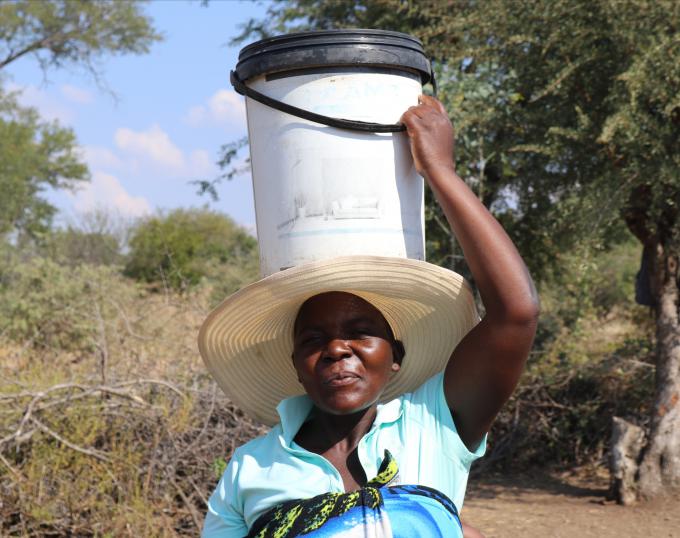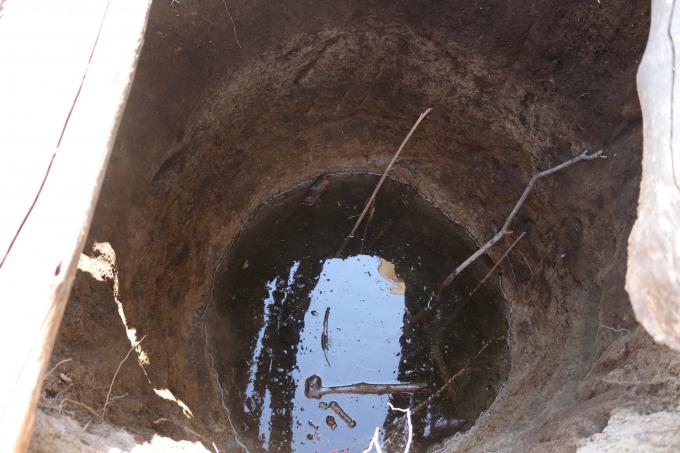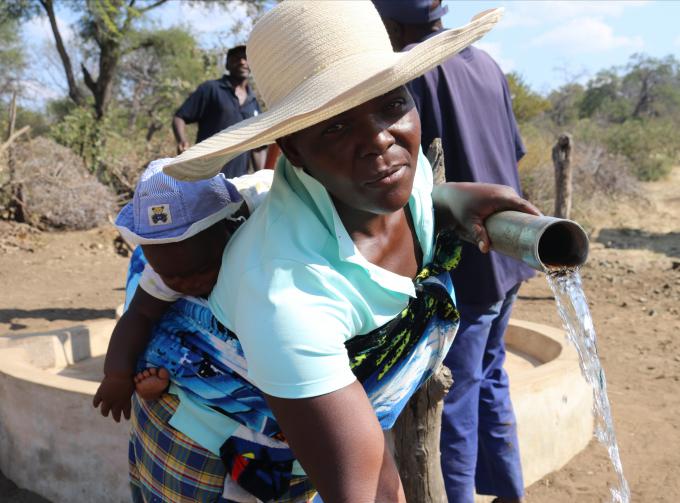Transforming Communities Through Improving Access to Safe and Clean Water
 Winnele lives with her seven children and husband, in a remote village nestled within the hot and arid Beitbridge district of Zimbabwe bordering Zimbabwe and South Africa. She knows too well the struggle of not having access to clean water. As is often the case in many communities, the burden of fetching water falls solely on women and girls, leaving them with little time for other activities such as education or income-generating work.For years, Winnele had to trek to the nearest water source, three kilometres away, several times a day to fetch clean water for her family. She had to brave the scorching heat whilst fearing attacks by wild animals and strangers along the way.
Winnele lives with her seven children and husband, in a remote village nestled within the hot and arid Beitbridge district of Zimbabwe bordering Zimbabwe and South Africa. She knows too well the struggle of not having access to clean water. As is often the case in many communities, the burden of fetching water falls solely on women and girls, leaving them with little time for other activities such as education or income-generating work.For years, Winnele had to trek to the nearest water source, three kilometres away, several times a day to fetch clean water for her family. She had to brave the scorching heat whilst fearing attacks by wild animals and strangers along the way.
“I fetch water for my family by myself. My children are still too young to help,” Winnele said.
“Every day, we need seven 20-liter buckets of water for drinking, cooking, bathing and washing clothes. The distance to the borehole was too long and tiring for me, so, I sometimes resorted to fetching water at an open well nearby. The water from the well is dirty, but I had no choice. The best I could do was to sift and boil it. We were drinking dirt. My children would often complain of stomach pains, caused by drinking dirty water. We are lucky no one got seriously sick,” she explained.
“The well was also a danger to children, as they could fall in whilst fetching water,” Winnele added.
 Water is a basic human right, but many continue to lack it, and this compromises the health and well-being of families, mostly children. Without access to Water, Sanitation and Hygiene (WASH) services, children face an increased risk of contracting preventable diseases like Cholera. Save the Children partnered Beitbridge District Water and Sanitation Sub Committee to provide communities in Beitbridge with clean and safe water for drinking and household use. This is through financial support from the European Union through UNICEF and Food and Agriculture Organisation under the Enhanced Resilience for Vulnerable Households in Zimbabwe (ERVHIZ) project.
Water is a basic human right, but many continue to lack it, and this compromises the health and well-being of families, mostly children. Without access to Water, Sanitation and Hygiene (WASH) services, children face an increased risk of contracting preventable diseases like Cholera. Save the Children partnered Beitbridge District Water and Sanitation Sub Committee to provide communities in Beitbridge with clean and safe water for drinking and household use. This is through financial support from the European Union through UNICEF and Food and Agriculture Organisation under the Enhanced Resilience for Vulnerable Households in Zimbabwe (ERVHIZ) project.
Through this initiative a borehole in Winnele’s village, which had been dysfunctional for years was rehabilitated.The community can now access clean water without having to walk long distances. For Winnele, access to water means she can now grow vegetables that will enhance her children’s dietary intake, improving their health and well-being. She also hopes to generate income by selling surplus produce from her garden. The borehole is just five minutes away from her house, giving her more time to focus on other tasks such as adequately breastfeeding her child.
“I no longer worry about not having clean water or walking long distances to fetch water. I now have enough time to cater to the needs of my children such as breastfeeding my 7-month-old baby. I also plan to grow vegetables for feeding my children and selling,” she happily said.
 The project has not only improved access to clean water but has also empowered communities to take ownership of their resources and manage them. Community members identified a Water Point Management Committee consisting of both women and men. The committee was trained by Save the Children to ensure the borehole is well-maintained. The Water Point Committee encourages other community members to use the borehole diligently in order to prevent breakdowns and ensure sustainability.
The project has not only improved access to clean water but has also empowered communities to take ownership of their resources and manage them. Community members identified a Water Point Management Committee consisting of both women and men. The committee was trained by Save the Children to ensure the borehole is well-maintained. The Water Point Committee encourages other community members to use the borehole diligently in order to prevent breakdowns and ensure sustainability.
“This borehole is a treasure to us, so we need to make sure it is well maintained. Now that we have a functional borehole nearby, women and girls no longer need to walk long distances that put them at risk of being abused in the thick bushes when looking for water. Children can now attend school regularly without missing out due to delays in fetching water,” Siziba, Water Point Committee chairperson alluded.
“We were at risk of contracting Cholera. The news on radio reported that Cholera made people sick, right here in Beitbridge. Now that we have clean water for drinking, cooking, and washing hands, we can protect ourselves and our children. So, we need to protect this borehole at all costs,” said Siziba.
Forty-five dysfunctional boreholes have been rehabilitated, offering improved access to clean water for more than 12,500 people, including women and children, from six wards in Beitbridge district.
 Zimbabwe
Zimbabwe